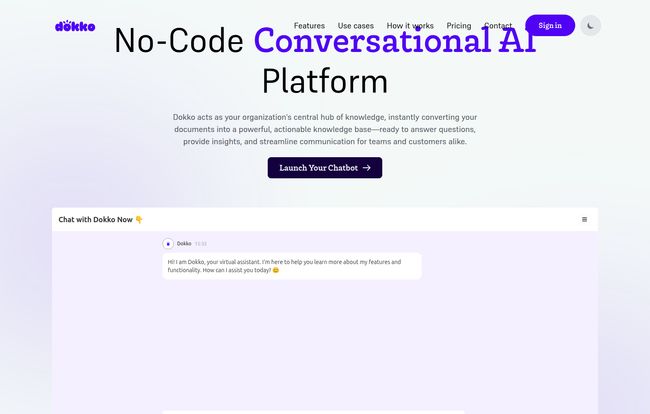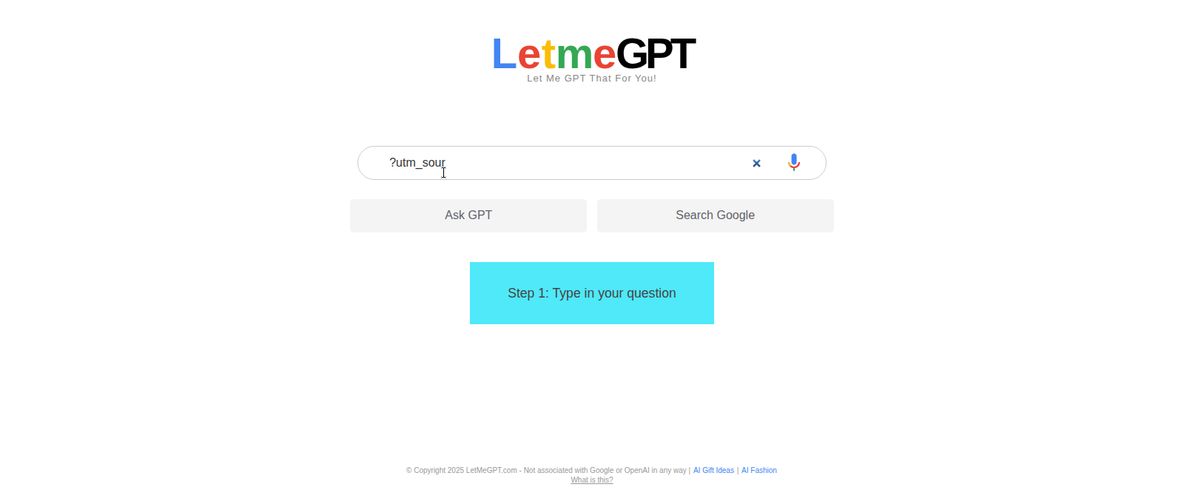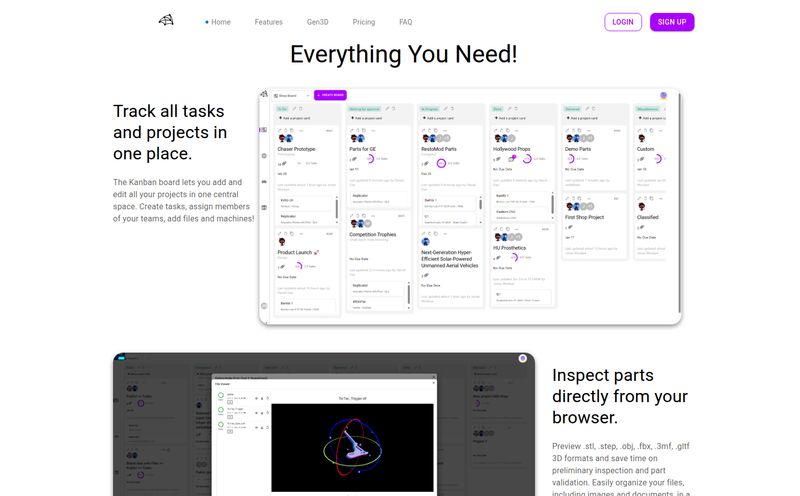Information Overload is Real. And It’s Killing Your Productivity.
Let’s be real for a second. We’ve all been there. It’s 3 PM on a Tuesday, and you’re hunting for that one specific detail in a mountain of company documents. Is it in the Google Drive from 2021? A stray PDF someone Slacked over? Maybe it's in that ancient Sharepoint folder nobody dares to touch. The whole ordeal feels less like work and more like a digital archaeology dig. It’s a massive, frustrating waste of time.
For years, the solution was always “better organization.” More folders. Stricter naming conventions. Another new platform promising to be the one source of truth. And yet, the chaos always finds a way back in. I’ve seen it at every agency I’ve worked with. It’s a universal problem.
So when I stumble across a tool like Dokko, which claims to be a “No-Code Conversational AI Platform,” my inner SEO-nerd and jaded marketer both sit up and pay attention. The promise? To turn that chaotic pile of documents into a smart, conversational knowledge base. Basically, an expert assistant you can just talk to. A bold claim. But is it just another buzzword-filled dream, or is there something genuinely useful here?
So, What is Dokko, Really?
Forget the corporate jargon for a moment. At its heart, Dokko is a translator. It takes all your dense, static documents—think PDFs, Word files, internal guides, you name it—and translates them into a dynamic, queryable format. It's like hiring a super-fast intern who has memorized every single document your company has ever created and can give you the exact answer you need, instantly.
The magic words here are “no-code.” You don’t need to be a developer. You don’t need to understand APIs or write a single line of Python. If you can drag and drop a file, you can use Dokko. This, for me, is the barrier-to-entry that so many other AI tools get wrong. They’re built for techies, by techies. Dokko feels like it was built for the rest of us. For the marketing teams, the HR departments, and the customer support reps who are actually on the front lines.
How Dokko Turns Your Document Mess into Magic
The process they lay out is refreshingly simple. Almost too simple, if I’m being honest. It breaks down into a few logical steps:
- Upload Your Documents: You start by feeding the machine. Gather up all those scattered files—your training manuals, product specs, legal policies, HR guidelines—and bring them into the Dokko platform.
- Build a Knowledge Base: This is where the AI does its heavy lifting. Dokko scans, reads, and indexes everything, connecting the dots between different pieces of information. It's not just storing files; it's understanding them.
- Generate a Smart Chatbot: With the click of a button (or so they claim), this knowledge base gets a friendly face: a chatbot. This bot is now armed with all your company’s wisdom, ready to answer questions.
- Start Conversing: You can embed this chatbot on your website for customer support, use it internally to help train new hires, or integrate it into your workflows to give your team instant answers.
It’s an elegant workflow that tackles the problem head-on. Instead of forcing you to organize your mess, it just ingests the mess and organizes it for you.

Visit Dokko
The Real-World Problems Dokko Actually Solves
A tool is only as good as the problems it solves, right? The list of use cases for Dokko is pretty extensive, and some of them are more compelling than others. I see them falling into a few main categories.
Revamping Your Customer and Employee Experience
This is the obvious one. Think about instant, 24/7 Customer Support. No more waiting for an agent to find the right return policy document. The bot knows. Or consider Employee Training and HR/Recruitment. A new hire could just ask the bot, “What’s our policy on vacation days?” or “Where can I find the brand style guide?” instead of bugging a manager. This is about reducing friction and giving people the autonomy to find information themselves.
For the Tech and Legal Eagles
Here’s where accuracy is everything. For IT support and troubleshooting, a bot could guide an employee through a common issue before a ticket is even created. For Compliance and Safety Training, you can ensure everyone has access to the most up-to-date protocols. And for Legal Consultation, a paralegal could quickly query thousands of case files for precedents. The potential here is huge, provided the AI is accurate.
Niche Applications That Made Me Look Twice
I have to admit, a couple of their suggested use cases stood out. Political Campaigns? That's fascinating. Imagine a bot armed with a candidate's entire platform, ready to answer voter questions instantly and consistently. Or Research Assistance, where academics could feed a bot hundreds of research papers and then query them for specific data points. It shows the flexibility of the platform beyond the standard corporate use cases.
The Features That Actually Matter (My Take)
Let's cut through the marketing fluff. Here are the features that, in my experience, make a real difference.
- Centralized Knowledge & No-Code: I've already touched on this, but it can't be overstated. This is the core value. It democratizes the power of AI for your entire organization.
- Quality Control Against Hallucinations: This is a big one. We've all seen AI go off the rails, confidently making up complete nonsense. Dokko claims to have “advanced safeguards” to keep the bot grounded in your documents. It will only answer based on the source material you provide. If it doesn't know, it won't invent an answer. This is crucial for building trust.
- Human Handover: No bot is perfect. The ability for the chatbot to seamlessly escalate a conversation to a human agent is not just a nice-to-have; it's non-negotiable for any serious customer-facing tool. It shows they understand the limitations of AI.
- Multilingual Support: For any company with a global footprint, this is huge. Having one knowledge base that can serve customers and employees in different languages without extra work is a serious competitive advantage.
Let's Talk Money: Dokko Pricing Explained
Alright, the all-important question: what does it cost? Dokko has a tiered structure that seems pretty standard for a SaaS platform. It’s transparent, which I appreciate.
| Plan | Price | Who It's For (My Opinion) |
|---|---|---|
| Standard | $29 /month/member | This feels like the sweet spot for most small to medium-sized teams. You get unlimited chatbots and users, focused on internal collaboration and knowledge sharing. If your primary goal is to organize your internal chaos, this is your starting point. |
| Professional | $139 /month/member | This is a significant jump in price. This tier is for those who are serious about deploying public-facing chatbots. It adds features like public access to your knowledge sources and automated answer analysis. Best for freelancers, individual consultants, or businesses whose primary customer interaction is via chat. |
| Enterprise | Inquire for price | The classic “call us” plan. This is for large organizations with specific needs like on-premises hosting, API integration, and dedicated priority support. Think banks, hospitals, or large corporations with strict data security requirements. |
Both the Standard and Professional plans come with a 7-day free trial, which is great. It’s enough time to upload a few key documents and see if it actually works for your specific needs before you commit.
The Good, The Bad, and The Maybe
No tool is perfect. After digging through everything, here’s my honest breakdown.
The Good Stuff is genuinely good. It’s incredibly easy to get started thanks to the no-code interface. The idea of transforming your messy document swamp into a centralized, actionable knowledge hub is a powerful one. The safeguards against AI hallucinations and the multilingual support are standout features that show a mature understanding of the market's needs.
Now for the things to consider. The effectiveness of the whole system hinges on the quality of the documents you upload. The old saying “garbage in, garbage out” is truer than ever here. If your source material is outdated, contradictory, or just plain wrong, your chatbot will be too. Also, you are relying on a third-party vendor for a core part of your knowledge infrastructure, which is always a consideration. The pricing jump from Standard to Professional is also quite steep, so you'll need a clear business case for those advanced features.
Is Dokko the Answer to Your Document Chaos?
So, we circle back to the main question. Is Dokko worth it?
In my opinion, if your team is constantly bogged down by information hunting and you're looking for a way to streamline support and internal knowledge sharing without hiring a team of developers, then yes. It's absolutely worth exploring. The barrier to entry is low, and the potential upside in saved time and reduced frustration is massive.
It’s not a magic wand that will instantly fix a broken company culture or poorly written documents. But it is a powerful, accessible tool that puts advanced conversational AI into the hands of the people who need it most. And in a world drowning in information, a tool that helps you find the right answer, right now, is a very valuable thing indeed.
Frequently Asked Questions
- Is there a free trial for Dokko?
- Yes, both the Standard ($29/mo/member) and Professional ($139/mo/member) plans offer a 7-day free trial so you can test out the platform.
- How secure is my data with Dokko?
- Dokko emphasizes security. For maximum control, the Enterprise plan offers dedicated or on-premises hosting options, ensuring your data stays within your own infrastructure.
- Can I cancel or change my plan?
- Yes, based on standard SaaS practices shown on their pricing page, you should be able to cancel or change your plan at any time. The specifics would be in their terms of service.
- What happens at the end of the free trial?
- Typically, at the end of a trial, you'll be prompted to upgrade to a paid plan to continue using the service. Your account and data may be paused or deleted if you don't upgrade.
- Can Dokko be customized for specific use cases?
- Yes. The Enterprise plan is specifically designed for customization, offering API integration and specialized functionality to fit unique organizational needs.
- What if the chatbot can't answer a question?
- Dokko includes a 'Human Handover' feature, which allows the bot to seamlessly pass the conversation to a real person when it gets stuck or the user requests it. This prevents dead-end conversations.
Reference and Sources
- Dokko Official Website: https://dokko.ai/
- A study on AI Hallucinations by researchers at the University of Oxford: https://www.ox.ac.uk/news/2023-11-02-new-research-ai-hallucinations-could-be-cured



